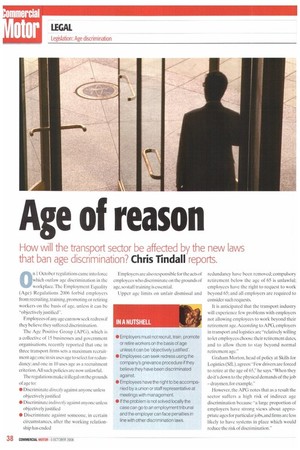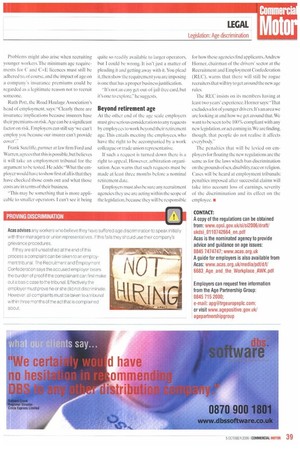Age of reason
Page 38

Page 39

If you've noticed an error in this article please click here to report it so we can fix it.
How will the transport sector be affected by the new laws that ban age discrimination? Chris Tindall reports.
On 1 October regulations came into force which outlaw age discrimination in the workplace. The Employment Equality (Age) Regulations 2006 forbid employers from recruiting, training, promoting or retiring workers on the basis of age, unless it can be "objectively justified".
Employees of any age can now seek redress if they believe they suffered discrimination.
The Age Positive Group (APG). which is a collective of 15 businesses and government organisations, recently reported that one in three transport firms sets a maximum recruitment age;one in six uses age to select for redundancy: and one in 10 uses age as a recruitment criterion. All such policies are now unlawful.
The regulations make it illegal on the grounds of age to: • Discriminate directly against anyone unless objectivelyjustifted • Discriminate indirectly against anyone unless objectively justified • Discriminate against someone, in certain circumstances, after the working relationship has ended Employers are also responsible for the acts of employees who discriminate on the grounds of age, so staff training is essential.
Upper age limits on unfair dismissal and redundancy have been removed; compulsory retirement below the age of 65 is unlawful; employees have the right to request to work beyond 65; and all employers are required to consider such requests It is anticipated that the transport industry will experience few problems with employers not allowing employees to work beyond their retirement age. According to APG, employers in transport and logistics are "relatively willing to let employees choose their retirement dates, and to allow them to stay beyond normal retirement age."
Graham Morton, head of policy at Skills for Logistics (SfL).agrees:"Few drivers are forced to retire at the age of 65," he says. "When they do ifs down to the physical demands of the job — drayme n, for example."
However, the APG notes that as a result the sector suffers a high risk of indirect age discrimination because "a large proportion of employers have strong views about appropriate ages for particular jobs, and firms are less likely to have systems in place which would reduce the risk of discrimination." Problems might also arise when recruiting younger workers. The minimum age requirements for C and C+L licences must still he adhered to, of course, and the impact of age on a company's insurance premiums could be regarded as a legitimate reason not to recruit someone.
Ruth Peat, the Road Haulage Association's head of employment, says: "Clearly there are insurance implications because insurers base their premiums on risk.Age can he a significant factor on risk. Employers can still say 'we can't employ you because our insurer can't provide cover'.
Frank Sutcliffe, partner at law firm Ford and Warren, agrees that this is possible.but believes it will take an employment tribunal for the argument to be tested. He adds: "What the employer would have to show first of all is that they have checked those costs out and what those costs are in terms of their business.
"This may be something that is more applicable to smaller operators. I can't see it being quite so readily available to larger operators, but I could be wrong. It isn't just a matter of pleading it and getting away with it, You plead it, then show the requirement you are imposing is one that has a proper business justification.
"It's not an easy get-out-of-jail-free card, hut it's one to explore," he suggests.
Beyond retirement age
At the other end of the age scale employers must give serious consideration to any requests by employees to work beyond their retirement age."1'his entails meeting the employees, who have the right to be accompanied by a work colleague or trade union representative.
If such a request is turned down there is a right to appeal. However, arbitration organisation Acas warns that such requests must be made at least three months before a nominal retirement date.
Employers must also be sure any recruitment agencies they use are acting within the scope of the legislation, because they will be responsible for how these agencies find applicants. Andrew Horner, chairman of the drivers' sector at the Recruitment and Employment Confederation (REC), warns that there will still be rogue recruiters that will try to get around the new age rules.
'fhe REC insists on its members having at least two years' experience. Horner says:"That excludes a lot of younger drivers, It's an area we are looking at and how we get around that. We want lobe seen to be 100% compliant with any new legislation,or act coming in.We are finding. though, that people do not realise it affects everybody."
The penalties that will be levied on employers for flouting the new regulations are the same as for the laws which ban discrimination on the grounds of sex. disability,race or religion. Cases will be heard at employment tribunals; penalties imposed after successful claims will take into account loss of earnings, severity of the discrimination and its effect on the employee. •
























































































































































































